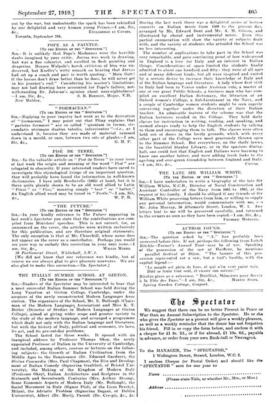THE ITALIAN SUMMER SCHOOL AT GIRTON. [To THE EDITOR OF
THE " SPECTATOR."] SIR,—Ileaders of the Spectator may be interested to hear that a most successful Italian Summer School was held during the Long Vacation at Girton College, Cambridge, under the auspices of the newly reconstructed Modern Languages Asso- ciation. The organizers of the School, Mr. E. Bullough (Chair- man of the Modern Languages Association) and Miss K. T. Butler (Director of Studies in Modern Languages at Girton College), aimed at giving wider scope and greater variety to the study of the modern language, and arranged a programme which dealt not only with the Italian language and literature, but with the history of Italy, political and economic, its laws, its art, and its present-day problems.
The School lasted for three weeks. It opened with en inaugural address by Professor Thomas Okey, the newly appointed Professor of Italian in the University of Cambridge, and included, among others, courses or lectures on the follow- ing subjects: the Growth of Italian Civilization from the Middle Ages to the Renaissance (Dr. Edmund Gardner), the Divine Commedia (Mrs. Paul Chapman), the Rise and Develop- ment of Italian Comedy (Signorina Gualtieri, of Bristol Uni- versity), the Making of the Kingdom of Modern Italy (Pr-ofessor Okey), Italian Architecture and Sculpture in the Sixteenth and Seventeenth Centuries (Mrs. Arthur Strong), Some Economic Aspects of Modern Italy (Mr. Bullough), the Social Movement in Italy (Signor Pioli, of the Liceo Berchet, Milan), the Adriatic Problem (Signorina Degani, of Dublin University), Alfieri (Dr. Mari), Pascoli (Dr. Crespi), &c., &c.
During the last week there was a delightful series of lecture concerts on Italian music from 1500 to the present day. arranged by Mr. Edward Dent and Mr. A. M. Gibson, and illustrated by choral and instrumental music. Even this partial enumeration will show the variety of subjects dealt with, and the variety of students who attended the School was no less interesting.
The number of applications to take part in the School was very remarkable, and gave convincing proof of how widespread in England is a love for Italy and an interest in Italian things. Considerations of space limited the students finally admitted to about one hundred and fifty: they were of all ages and of many different kinds, but all were inspired and united by a serious desire to increase their knowledge of Italy and of the Italian language and literature. A lady whose first visit to Italy had been to Venice under Austrian rule, a master at one of our great Public Schools, a business man who has com- piled an excellent Italian dictionary, the librarian of an Oxford women's College, a Sub-Lieutenant in the Navy, and a couple of Cambridge women students might be seen eagerly conversing together under the direction of their Italian teacher. An admirable feature of the scheme was that the Italian lecturers resided in the College. They held daily classes for instruction in writing, reading, and speaking, and seemed always ready to help the English students by talking to them and encouraging them to falk. The classes were often held out of doors in the lovely grounds, which with every other part of the College were most generously thrown open to the Summer School. But everywhere, on the shady lawns, in the beautiful Stanley Library, or in the spacious dining- hall, one could feel that English and Italians were learning to know one another better, and were adding fresh links to the age-long and ever-green friendship between England and Italy.


































 Previous page
Previous page